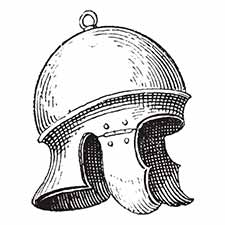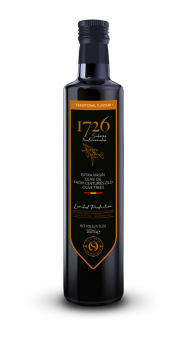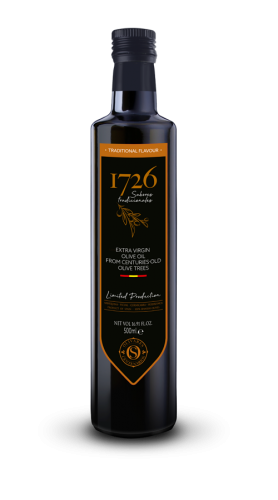
Extra Virgin Olive Oil from Centuries-old Olive Trees

Olive groves with history that are part of history.
Our project was born as an idea in 2013 when one of our partners was developing a product and meets a person who wanted to market centennial olive trees, which due to the crisis were being cut down and replaced by more profitable crops.
Thousands of years of history and irreplaceable trees were thus being lost.
It was not until 6 years later that our project crystallized with the encounter of an “almazara” that works with the best quality and with centennial and millennial trees, where a reasonable price could be paid for sustainable production.
So the other half joins Olivares del Sur, a businessman with great knowledge of the sector and with olive groves in Abanilla.
Together we try to get the best oil in the area with the best characteristics.
An olive oil faithful to history, with olive trees that have been present since time immemorial, with the traditional flavor of centuries past.

The history of our land and our olive trees
200 BC

The Abanilla Region in southern Spain has had human settlements since prehistoric times, but it was with the arrival of the Romans, around 200 BC, when the olive tree was introduced into Spain.
For years, the production of olive oil led Roman Hispania to be a prosperous and important province for the Roman Empire.
The importance of the cultivation of the olive tree has transcended to this day, being at present extra virgin olive oil one of the star products of Spain.
779 AD

Caliph Abderraman I conquered the area definitively for the Muslims in 779, establishing a province with the current terms of Murcia and Alicante, whose capital would be Orihuela and which will remain so until 1031.
The main written reference to the Muslim period dates from the 12th century and is due to the geographer Al-Idrisi, who mentions the textile wonders that are manufactured in Albanyala, Albayada or Banyaliya, different denominations of Abanilla during the Muslim domination.
The word “aceite” (oil) derives from the Arabic azzayt and replaces the Latin oleum.
1600 AD
In 1434, a descendant of the Rocafull family gave Abanilla to the Order of Calatrava.
Around 1650 Cervantes, the writer of Don Quixote, names the custom in the Jewish quarters of frying with olive oil, since it was a kosher food and pork fat was prohibited by the Jewish religion, this custom would later be adopted throughout the peninsula .
The Muslims who used the fat of the lamb would also use this oil for frying as they consider it of better quality.
1800 AD

In 1820, the confiscations began in Spain, a process by which state action converted the properties and rights that until then had constituted the patrimony of various civil and ecclesiastical entities into national assets.
Framed in this process, Abanilla was separated from the Order of Calatrava in 1856, which meant his full integration into national life.
From 1840 on, the millenary and centenary olive trees of the area began to be registered in the cadastre.
Present time. In Abanilla south of the Huerta de Mahoya, next to the Chícamo River, there is one of the few and rare ancient olive groves that remain in the Mediterranean, largely due to its proximity to the river and to the network of ditches dating from Roman times.
In Abanilla south of the Huerta de Mahoya, next to the Chícamo River, there is one of the few and rare ancient olive groves that remain in the Mediterranean, largely due to its proximity to the river and to the network of ditches dating from Roman times.
Olivares del Sur sells limited editions of oil from these Abanilla olive trees in its “1726” oil.
200 BC

The Abanilla Region in southern Spain has had human settlements since prehistoric times, but it was with the arrival of the Romans, around 200 BC, when the olive tree was introduced into Spain.
For years, the production of olive oil led Roman Hispania to be a prosperous and important province for the Roman Empire.
The importance of the cultivation of the olive tree has transcended to this day, being at present extra virgin olive oil one of the star products of Spain.
779 AD

Caliph Abderraman I conquered the area definitively for the Muslims in 779, establishing a province with the current terms of Murcia and Alicante, whose capital would be Orihuela and which will remain so until 1031.
The main written reference to the Muslim period dates from the 12th century and is due to the geographer Al-Idrisi, who mentions the textile wonders that are manufactured in Albanyala, Albayada or Banyaliya, different denominations of Abanilla during the Muslim domination.
The word “aceite” (oil) derives from the Arabic azzayt and replaces the Latin oleum.
1600 AD

In 1434, a descendant of the Rocafull family gave Abanilla to the Order of Calatrava.
Around 1650 Cervantes, the writer of Don Quixote, names the custom in the Jewish quarters of frying with olive oil, since it was a kosher food and pork fat was prohibited by the Jewish religion, this custom would later be adopted throughout the peninsula .
The Muslims who used the fat of the lamb would also use this oil for frying as they consider it of better quality.
1800 AD

In 1820, the confiscations began in Spain, a process by which state action converted the properties and rights that until then had constituted the patrimony of various civil and ecclesiastical entities into national assets.
Framed in this process, Abanilla was separated from the Order of Calatrava in 1856, which meant his full integration into national life.
From 1840 on, the millenary and centenary olive trees of the area began to be registered in the cadastre,.
Present time

In Abanilla south of the Huerta de Mahoya, next to the Chícamo River, there is one of the few and rare ancient olive groves that remain in the Mediterranean, largely due to its proximity to the river and to the network of ditches dating from Roman times.
Olivares del Sur sells limited editions of oil from these Abanilla olive trees in its “1726” oil.
Witnesses of our history come to your table

Witnesses of our history come to your table


Olivares del Sur s.l.
Carretera de Orihuela 49
Abanilla 30640
Murcia, Spain
Phone: +34 665 87 98 42
Olivares del Sur s.l.
Carretera de Orihuela 49
Abanilla 30640
Murcia, Spain
Phone: +34 665 87 98 42
Join our newsletter
Olivares del Sur Privacy Policy
and consent to receive
Olivares del Sur e-mails.
© 2020 Copyright Olivares del Sur s.l. – All rights reserved.
